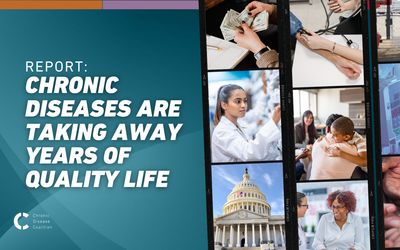
By Mary Kay Clunies-Ross, Executive Director, Chronic Disease Coalition
This week, The Washington Post reported an extraordinary body of research and analysis about the downward trend of American life expectancy. What they found in a year's worth of reporting is what the chronic disease community has long known: chronic diseases are taking away years of quality life. Whether it's heart, liver, kidney or other disease, more and more Americans are living sick and dying early.
In reading these stories, I was struck by how much the findings aligned with the conversations we have every day at the Chronic Disease Coalition with our ambassadors and organizational partners.
Quotes from the October 3 story titled: An Epidemic of Chronic Illness is Killing Us Too Soon.
Breakthroughs in technology, medicine and nutrition that should be boosting average life spans have instead been overwhelmed by poverty, racism, distrust of the medical system, fracturing of social networks and unhealthy diets built around highly processed food, researchers told The Post.
Even before COVID, many of us saw the struggles that the U.S. was having around health outcomes. Across the country, we have skilled and knowledgeable doctors, nurses, technicians and others to provide compassionate, expert care. We have advanced technology, treatments and facilities. Medicaid expansion provided health insurance to millions of people who were otherwise without access to basic health services.
At the same time, as The Washington Post stories definitively shows, our health and life expectancy has been failing in comparison to other countries. We have what is grimly called “excess death.”
Why is this? Most “health” problems are not problems that begin in the health care system—they are problems with the health of our common civic, cultural and economic life.
“We have undying faith in big new technology and a drug for everything, access to as many MRIs as our hearts desire,” said [Elena] Marks, a senior health policy fellow at Rice University’s Baker Institute for Public Policy. “Eighty-plus percent of health outcomes are determined by nonmedical factors.
The best barometer of rising inequality in America is no longer income. It is life itself. Wealth inequality in America is growing, but The Post found that the death gap — the difference in life expectancy between affluent and impoverished communities — has been widening many times faster.
America’s medical system is unsurpassed when it comes to treating the most desperately sick people, said William Cooke, a doctor who tends to patients in the town of Austin, Ind. “But growing healthy people to begin with, we’re the worst in the world,” he said.
What are we doing about it? Good question. While specific bills may come and go, our issue areas are led by the needs of our patients to live healthy and full lives (2023 policy priorities here). We advocate for
- Expanded access to needed treatments
- Increased affordability and transparency, and
- Increased representation and equitable health outcomes.
We also need to raise the volume for state and federal lawmakers and ensure that this new data leads to better policy – and better patient outcomes.
ACTION: Share the report with your representatives
We encourage everyone to take a little time to read at least the chronic disease story, and dig in a little further into the package for more insight (read the key takeaways here). In addition to exploring the world of chronic disease, the Post explains the dynamics between poor and wealthy communities, the role of politics in health, the scary trends in pediatric populations and more.
We applaud The Washington Post for its deep analysis and human-centered reporting. This is the kind of information that policymakers and the public need as we work to build a healthier country for everyone.
Want to stay educated and engaged about what’s affecting patients who are managing chronic diseases? Sign up for our newsletter here for the latest news and actions you can take!